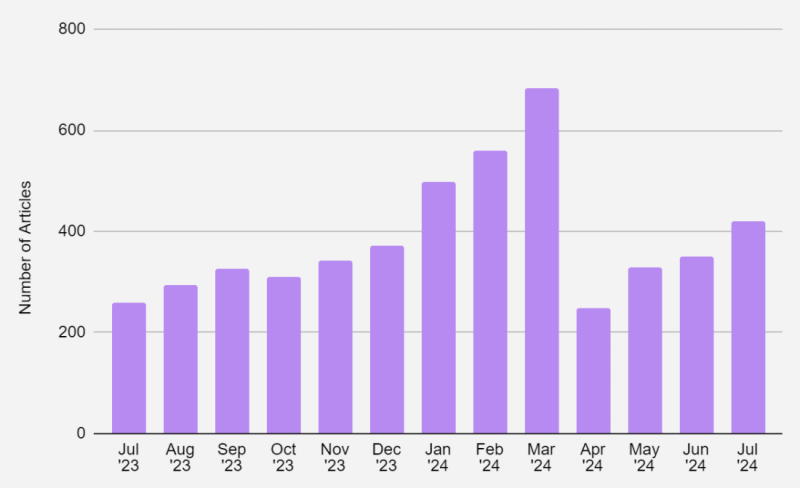Introduction
In this edition of Bridgehead Social Care's monthly news round-up we examine the adult social care sector's news coverage over the past month.
Between 1 and 31 July, references to 'adult social care' appeared in 420 unique media articles across the UK, a figure 20 per cent higher than June's coverage statistics, which stood at 350 articles.
For context, the chart below plots mentions of adult social care on a month-by-month basis over the past 12 months.

Coverage in July focused on several key recurring themes concerning the problems relating to local authorities struggling to maintain financial stability whilst coping with increasing demand for services, including adult social care. However, there was also a spike in coverage relating to Labour as it's victory in the general election sharpened focus on its plan for the sector as well as a noticeable increase in mentions of regulatory watchdogs, relating to the upheaval and crisis at the CQC.
Building on from that, a central focus of news outlets, including Sky News, The Guardian, The Independent and BBC News, focused on the government scrapping the delayed cap on care costs as part of its spending audit saving £1.1bn by the end of 2025-26. These reforms, originally scheduled for October 2023, included an £86,000 cap on personal care costs over a person's lifetime. However, due to delays and funding reallocations, the date was delayed by two years. Wes Streeting, Health and Social Care Secretary, had repeatedly affirmed the party's commitment to introducing the cap on care costs despite its absence from the official manifesto.
Reeves’ statement sounded the end for a reform that has been more than a decade in the making following an independent commission – led by economist Sir Andrew Dilnot in 2011. Reforms had been put on hold for the second half half of the last decade but Boris Johnson’s administration revived the plan in 2021 before delaying the planned start date from 2023 to 2025 after lobbying by council leaders that they would be unable to implement the changes. This lobbying picked up again following the election with councils warning no money had been put aside by the government to pay for this cap. In response to the decision, Sir Andrew Dilnot said Labour had “failed another generation of families” and that the changes were “a tragedy”.
Sky News reported on the crisis facing the CQC with the Health Secretary branding the organisation "not fit for purpose" due to the scale of its failings across health and social care providers.
According to ITV News, Labour faces a historic crisis in social care with both record people on waiting lists, persistent vacancies and continued underfunding. It also notes the lack of attention paid to the issue in the party's manifesto, leaving uncertainty as to their ambitions for the sector.
Meanwhile, Community Care has published a review of the Conservatives' 14 years in power, tracking its social care policies and the reasons for their failure to deliver meaningful reform to elderly care. Delays, lack of funding and changing policy positions have all exacerbated the problems for a sector already struggling under growing demand.
In other news, The Guardian reported on Ed Davey, Liberal Democrat leader, using his new record cohort of Liberal Democrat MPs to push for cross-party talks on fixing the social care crisis after decades of failure to enact meaningful reform.
ITV News - Waiting lists, staff shortages and a social care crisis loom over Labour
Labour faces a crisis in social care in England which has become severe, with an estimated 1.6 million elderly people not receiving the care they need and over five million unpaid carers in England and Wales. The Labour Party proposes creating a National Care Service to ensure consistent care across the country and introducing a Fair Pay Agreement in adult social care. However, the King’s Fund criticises the Labour manifesto for lacking concrete social care reform plans, describing it as a "plan to come up with a plan."
The Guardian - Lib Dems to push for cross-party talks on tackling social care
The Liberal Democrats plan to leverage their record contingent of MPs to push Keir Starmer to initiate cross-party talks on a new social care plan, emphasising the importance of addressing the needs of unpaid carers, a topic frequently raised by voters. A party source emphasised the need for cross-party talks on social care funding, with a focus on supporting unpaid carers, who were absent from the Labour manifesto. Davey, celebrating the party's success, reiterated their commitment to championing voters' concerns.
Community Care - The legacy of Conservative rule for adult social care
Challenges in social care are seen as a legacy of the Conservatives' 14-year tenure, including a decade of austerity that saw council budgets fall by 29 per cent in real terms, leading to significant cuts in adult social care despite increased demand and costs. The Care Act 2014 aimed to modernise social care legislation, but its implementation was hampered by fiscal constraints. Covid-19 further exacerbated the crisis. Labour's manifesto raised concerns about the lack of committed funding for new initiatives and potential future austerity measures.
An independent review into the CQC highlighted significant internal failings that hinder its ability to effectively monitor health and social care institutions. Social care providers also faced delays in registration and rating updates, affecting local capacity. Health Secretary Wes Streeting, expressed his concern over the CQC's shortcomings, describing it as "not fit for purpose." He assured the public of the government's commitment to addressing these issues and restoring confidence in care assessments. The CQC acknowledged the findings and is working quickly to rebuild trust. Dr. Dash's report revealed that one in five providers had not been rated, with some not re-inspected for years.
BBC News - Ditching of social care plan is a tragedy - Dilnot
Chancellor Rachel Reeves' decision to scrap planned changes to the care system in England has been described as a "tragedy" by Sir Andrew Dilnot, who originally proposed the reforms in 2011. Reeves explained that financial constraints prevented the new Labour government from implementing the changes, citing a £21.9bn government overspend by the previous Conservative administration. The scrapped plan included an £86,000 cap on care costs for older or disabled people and a more generous asset threshold for council support. The decision to abandon the reforms is expected to save £1bn by next year, but it leaves many older people facing high care bills. The history of social care reform in England has seen numerous plans ditched over the past 25 years.



